To be honest, as #Web3 has developed to this point, everyone is talking about 'decentralization', but if you look back: even the most 'decentralized' DApps have many backend deployments still on AWS, GCP, etc. You open-source the frontend and centralize the protocols, but if the key nodes get shut down with one click, it's still useless.
Recently, while researching new projects, @ICN_Protocol impressed our team. After deeply reading its white paper, I was deeply shocked. It doesn't aim to 'add a plugin' in the #Web3 world; it aims to directly replace centralized giants like AWS and rebuild a complete cloud computing paradigm that truly belongs to #Web3, turning computing power and cloud infrastructure into a global network of 'open source + shared + verified', becoming the future cornerstone of #AI and #Web3. This is a huge ambition, but it's not just talk—it's really being done. 🧐

Past pain points of Web2 internet:
We are facing a 'sovereignty crisis' in the Web2 internet. Today's internet relies almost entirely on a few oligarch companies (such as AWS, GCP, and Alibaba Cloud). Their services are indeed powerful, but the problems are obvious:
• All data is in their hands; whoever has the power can 'censor'
• Once they go down, the entire network collapses (a typical 'single point of failure')
• Users have no data sovereignty and can only 'passively accept' their rules and prices
It's like all of us renting a super large house, where the landlord can not only cut off the power but also rummage through your drawers to see your privacy, and the rent is not cheap.
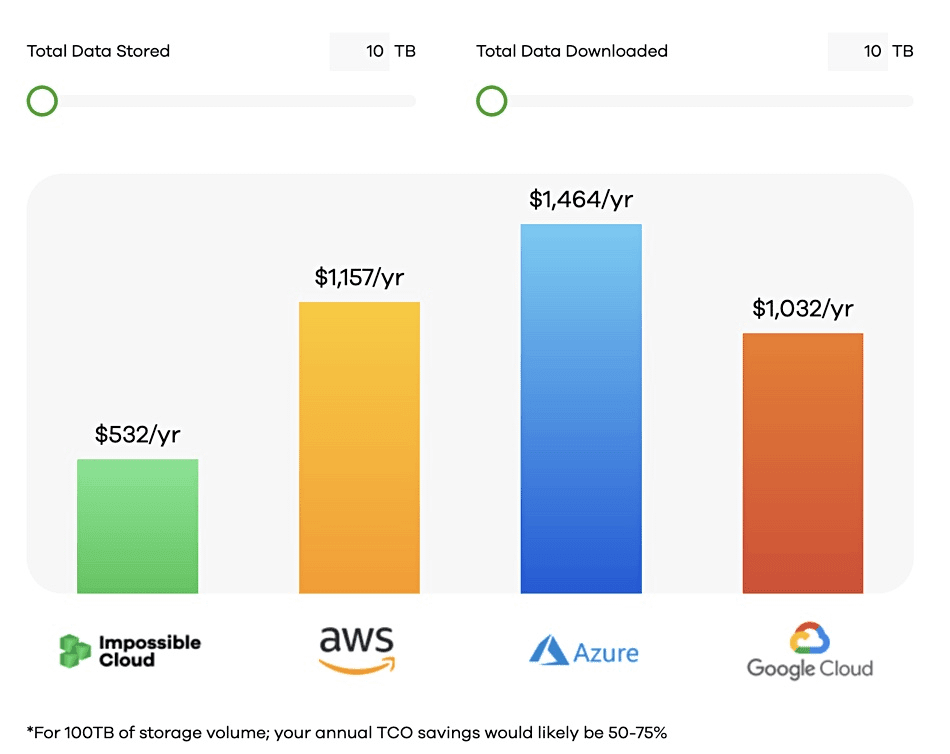
For a long time, we have seen many #Web3 projects trying to address the above pain points and have made many innovations, but the difficulties are great and the results are unsatisfactory. The main reasons are:
• Performance is inadequate: Many projects are decentralized but don't run fast, like a turtle pulling a cart
• Still relying on centralized cloud: Many 'decentralized' projects actually still rely on AWS for their underlying infrastructure...
• No service level agreements (SLA): Traditional enterprises are hesitant to use it because if problems arise, no one takes responsibility
At this moment, @ICN_Protocol not only solves Web2 pain points but also tackles Web3 pain points comprehensively, allowing #Web3 and #AI to run on a decentralized, verifiable, and composable cloud network, ensuring both performance and sovereignty while flexibly combining various services.
#ICNProtocol is the #AWS of the Web3 world, the 'king of bombs' project in the #DePIN track
We know that there are many #Web3 projects focusing on infrastructure—some on computing power, some on storage, some on GPUs—but they all look like 'puzzles':
• #Filecoin focuses on storage
• #Akash mainly focuses on computing power
• #Aethir and #ionet focus on GPU
But these are just partial function modules.
#ICNProtocol The model is: from the beginning, a unified architecture that combines 'storage + computing + network' into one. You can think of it like this: others sell screws, gears, and motors, while ICN sells a complete, fast-running 'Web3 cloud engine'.
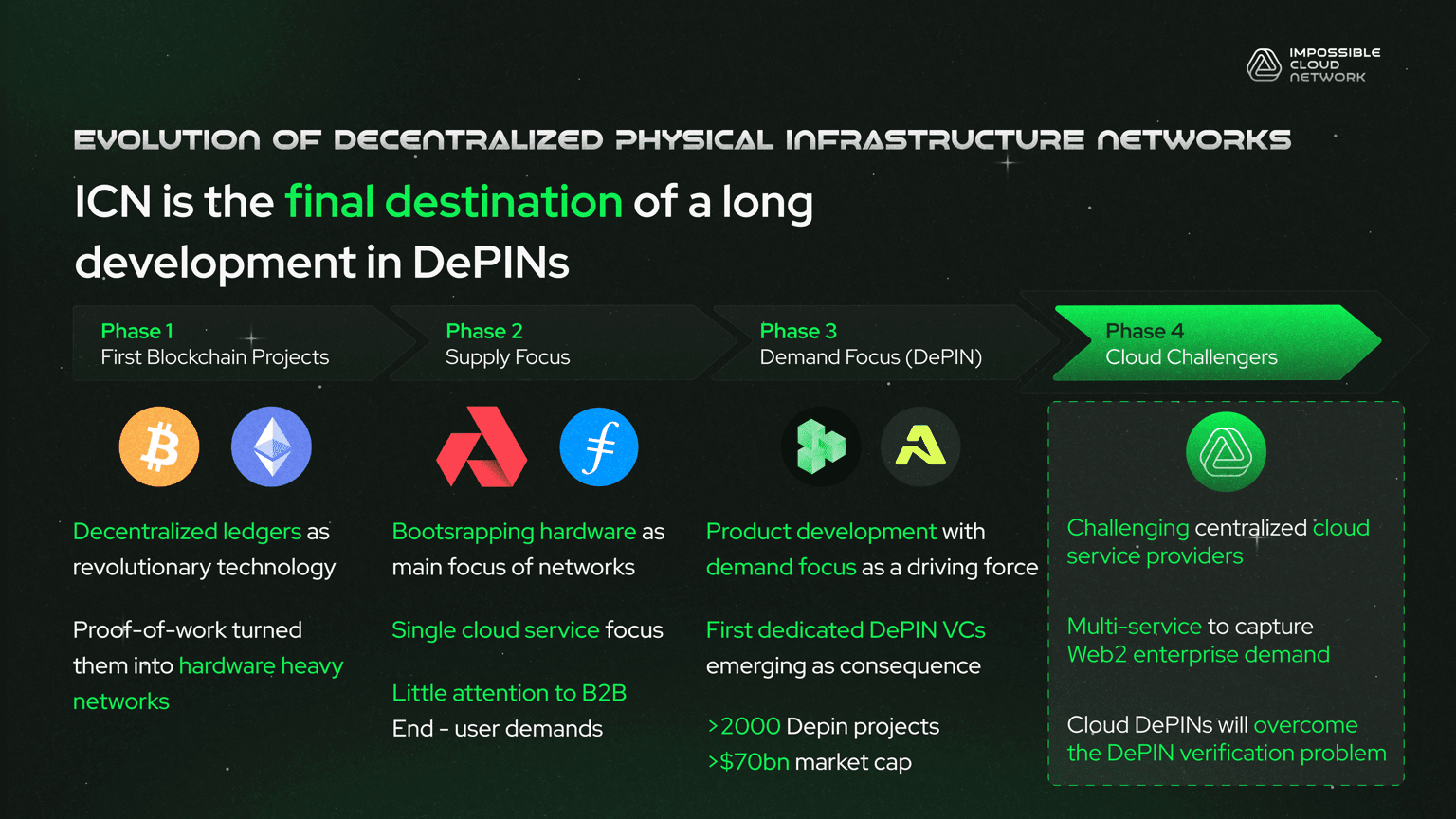
#ICNProtocol using a 'multi-layer network architecture' to implement the above plan, divided into 5 layers:
1️⃣ Hardware layer
• Hardware providers from around the world (e.g., companies, individuals) offer physical server resources
• Fully decentralized distribution to avoid 'single point failures'
• Provides resources such as computing power, storage, and bandwidth; hardware must be staked as collateral to ensure responsibility
2️⃣ Resource combination layer
• Assemble physical resources into service instances as needed
• Can deploy AI, applications, databases, etc.
• Supports 'regional restrictions', 'performance requirements', 'dynamic scaling', and other needs during combination
3️⃣ Performance verification layer (HyperNode Network)
• Using a validator network called HyperNode to assess hardware performance in real-time
• Upload results to the blockchain; those with better performance receive rewards
• No longer relying on 'cloud vendors saying my service is good', but rather having 'third-party ratings' on-chain
4️⃣ Service layer
• Various developers can deploy their own web services, such as AI interfaces, APIs, and web applications
• All services operate on resources provided by ICN, truly 'Web3-native'
5️⃣ Application layer
• Users and projects can directly call services using ICN's API, just like using AWS
• Compatible with both traditional Web2 deployment architectures and DevOps tools
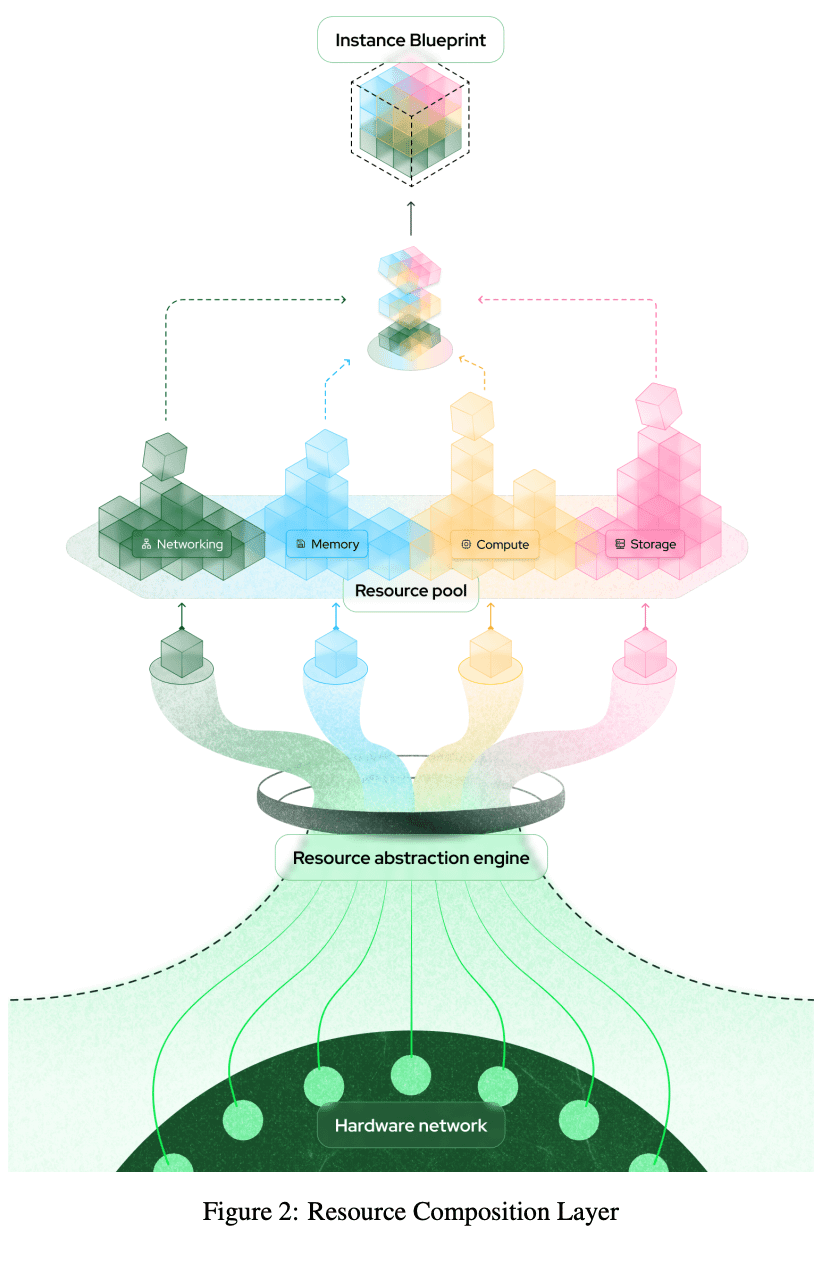
ICNProtocol's robust architectural solution has gained recognition from numerous enterprise clients and has generated real business revenue, no longer just a PPT project.
You may have heard of many #DePIN projects with elaborate white papers, but when it comes to token airdrops, users are just looking to cash out, and communities are sustained by airdrops.
ICNProtocol is completely different. They had already generated over $5 million in annual revenue before issuing tokens.
• 1000+ paid enterprise clients
• Node sales have already generated $12 million
• Processes 20 to 50 million files daily
• Global online storage capacity exceeds 50PB, with reserved orders exceeding 250PB
Many of these clients are traditional enterprises, data centers, tech companies, and research institutions in Europe. These individuals are not here to see your #DePIN narrative; they are using the services. Being able to establish a foothold among such clients indicates that this product can indeed run, run steadily, and run fast.
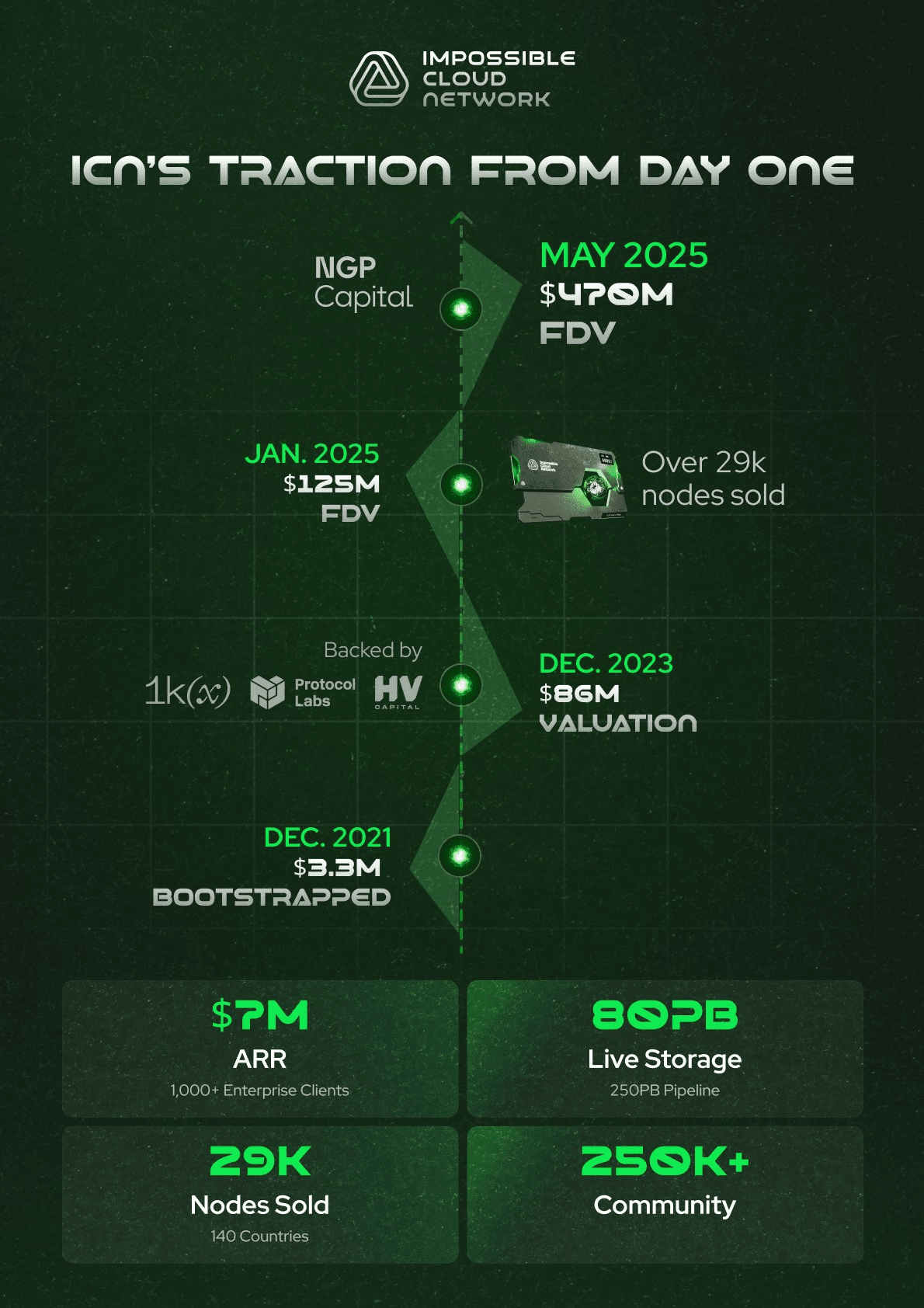
ICNProtocol started in Europe and is expanding globally: ICNProtocol is the first choice for #Web2 veterans transitioning to #Web3
ICNProtocol is not an 'imagined Web3', it follows the route of 'real-world Web2 implementation':
• In Europe, it has become one of the fastest-growing cloud service providers
• Customers mainly come from data-intensive industries (AI, gaming, B2B SaaS)
• Deployed across multiple data centers globally, already possessing enterprise-level service capabilities
This approach is something many #Web3 projects cannot learn. It's not about airdrops sustaining the community; it's about products attracting customers.
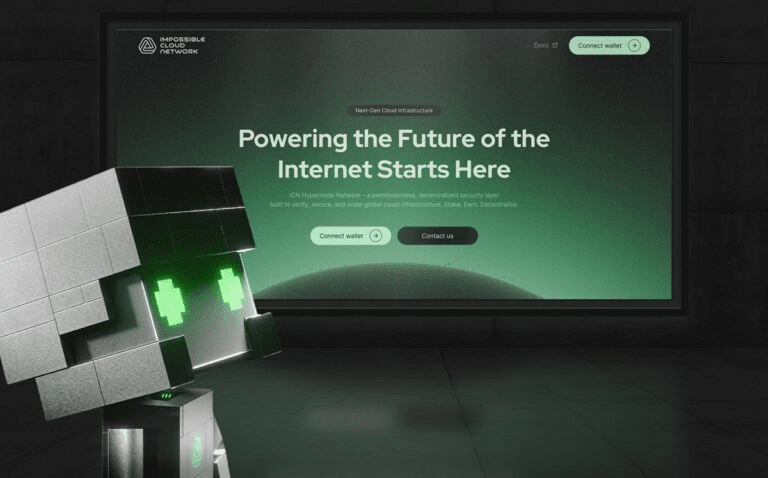
Team introduction:
Kai Wawrzinek is the founder and CEO of Impossible Cloud Network and the founder and CEO of Impossible Cloud. He holds a PhD in law from Heidelberg University.
Sebastian Pfeiffer is the Executive Director of Impossible Cloud Network. He previously worked at Impossible Cloud and Boston Consulting Group. He graduated from Aalto University and the University of Cologne.
Sara Teixeira is the Web3 Marketing Director of Impossible Cloud Network. She was previously the Marketing Director at Exclusible. She graduated from the University of the Arts London.

Investment background:
ICNProtocol has raised a total of $45 million, with investment institutions including #1kx, #HVCapital, #NGPCapital, #NoLimitHoldings, and #ProtocolLabs.
Interestingly, ICNProtocol has secured a very solid strategic investor—NGP Capital. It's a Silicon Valley industrial fund set up by Nokia, which has previously invested in top projects like Xiaomi (Series A), #Helium (the earliest DePIN), and #WorkFusion (AI automation).
NGPCapital particularly likes to bet on infrastructure projects that can change the 'underlying logic of technology'. Therefore, their investment in ICNProtocol also fully demonstrates treating 'decentralized cloud' as a new infrastructure megatrend worth paying attention to.
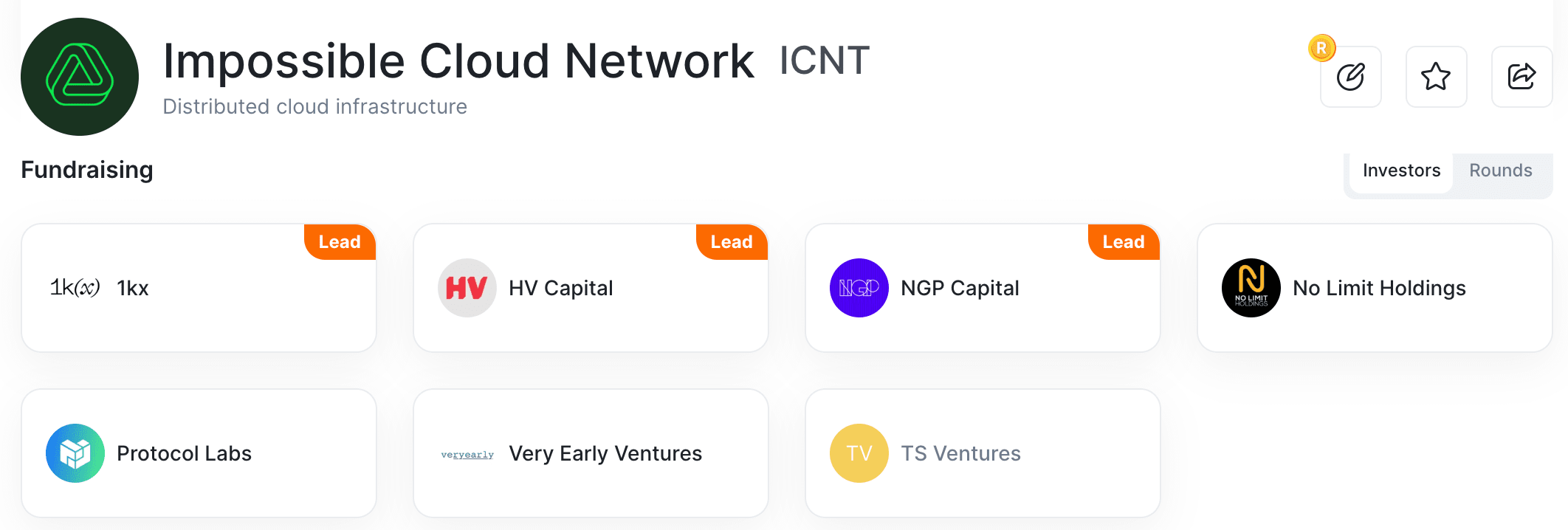
Token economics:
Token name: $ICNT
Total token supply: 700 million (fixed supply, never to be increased)
Internal holders (49%):
Team: 154.7 million (22.1%)
Investors: 150.5 million (21.5%)
Cloud service development company (DevCo): 37.8 million (5.4%)
Ecosystem and network incentives (51%):
Network rewards: 140 million (20.0%)
Partners: 77 million (11.0%)
Ecosystem development: 70 million (10.0%)
Network expansion: 70 million (10.0%)
Among them, the team and investors cannot sell—their tokens are locked for 1 year and gradually released over 3 years.
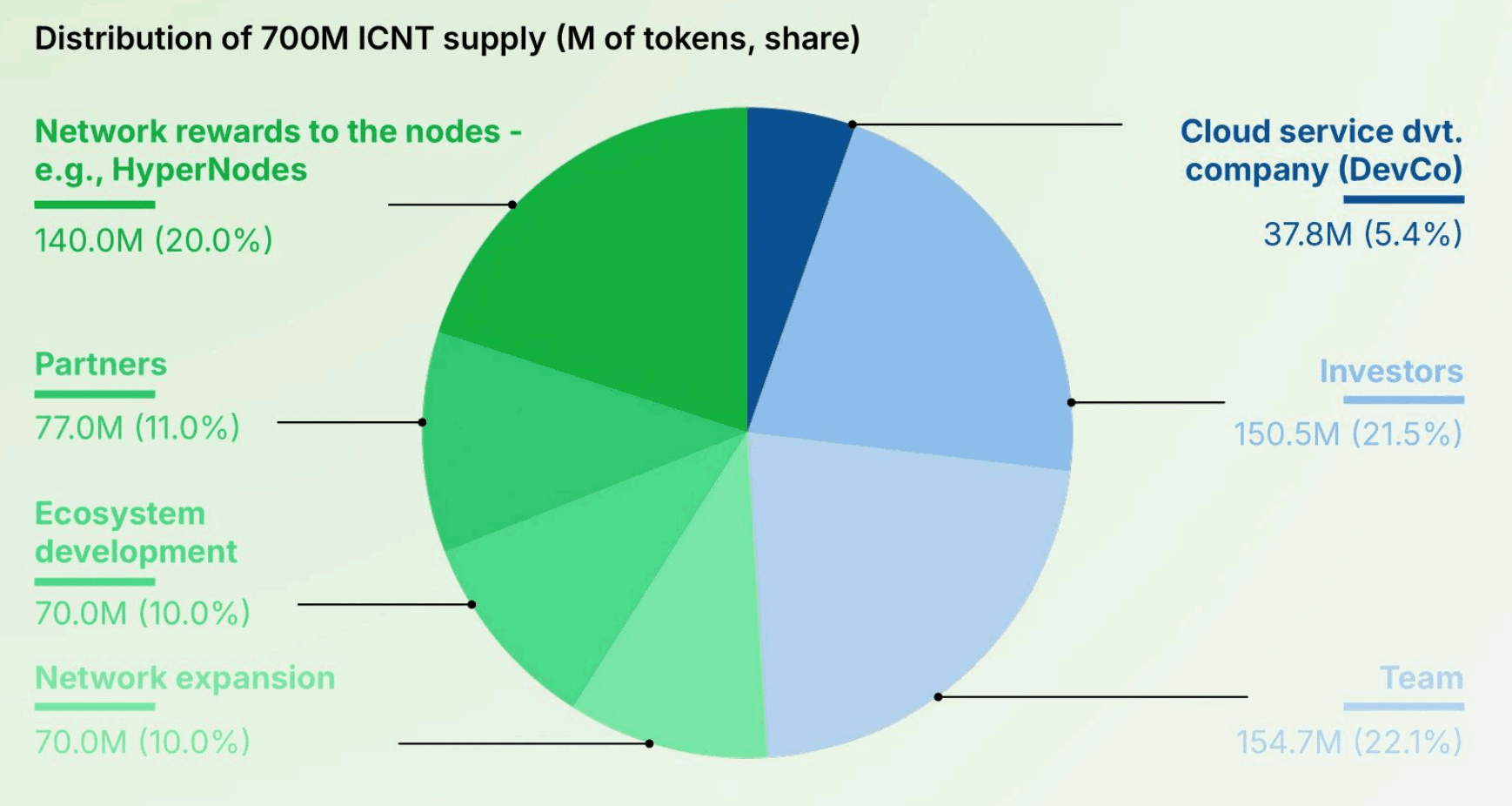
$ICNT token value capture:
In the entire ecosystem of ICNProtocol, $ICNT tokens are used to pay for service fees:
Node incentives: Storage providers receive $ICNT rewards for secure storage and data provision based on online time, bandwidth, and capacity.
Governance: $ICNT holders can vote on key decisions within the network, such as protocol updates, reward models, and data sovereignty rules.
Access to premium services: Certain features in the ecosystem—such as priority storage or API extensions—require $ICNT payment, enhancing the utility of the token.
It brings real utility to Web3, not just hype. 🧐
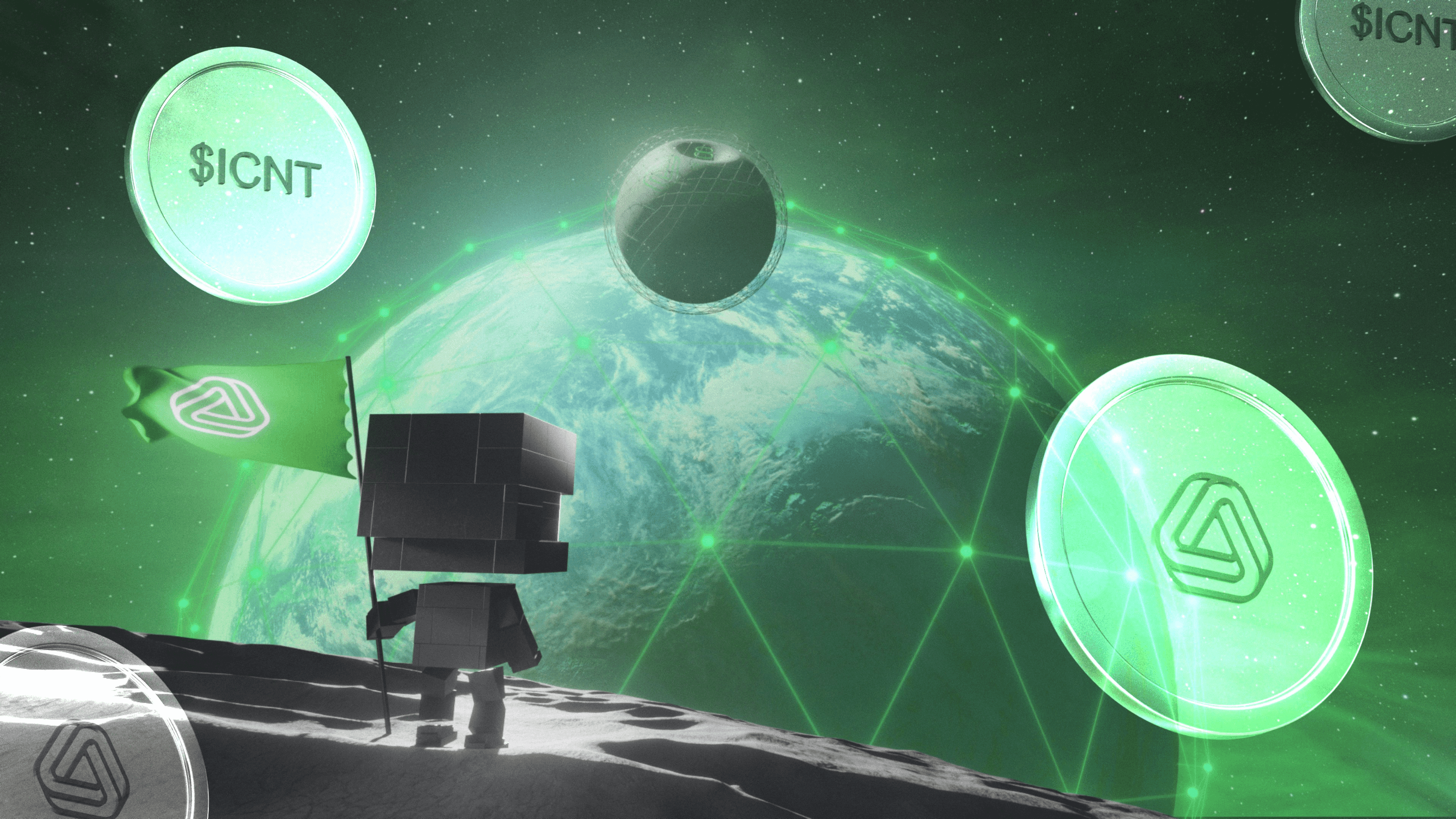
ICNProtocol business case analysis:
1️⃣ Web2 business → Web3 cloud migration (see Figure 1)
Currently, over half of the IT budget in the world is spent on 'public clouds'—this market is as large as $723.4 billion and is growing at a rate of 21.5% annually. This market is essentially monopolized by giants like AWS, Azure, Google Cloud, Alibaba Cloud, and Tencent, with serious centralization issues.
• You can only choose from a few options; prices can increase at any time (no choice)
• Data is stored with them, and you have no idea who accesses your data
• If one part fails, the whole system goes down
Due to the aforementioned issues, more and more #Web2 companies are choosing to migrate to #Web3 cloud, especially the painless migration plan of ICNProtocol, as well as Metal-as-a-Service (MaaS) and elastic on-demand solutions, which meet the needs of startup projects in AI, SaaS, and more.
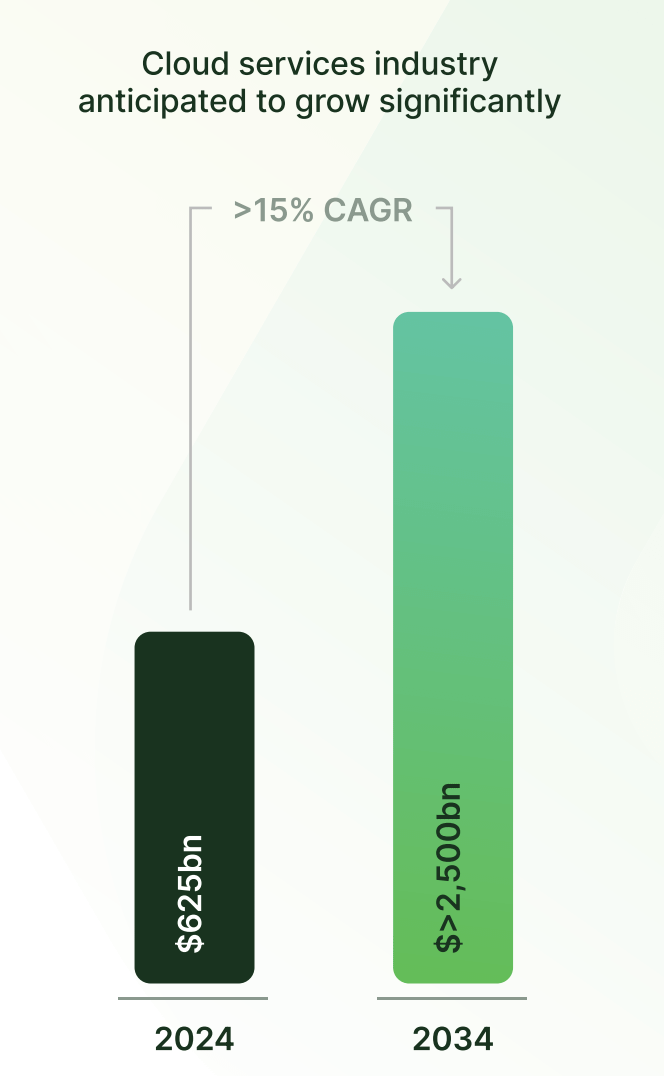
2️⃣ #AI projects benefit greatly (see Figure 2)
Now AI faces the bottleneck of 'tight computing resources', particularly: model training is getting more expensive, cloud vendor prices are high and difficult to adjust, and #AI inference and agent demands require 'low latency + high availability' and other pain points. Traditional cloud service providers either have excessively high costs or cannot provide on-demand configurations.
ICNProtocol aligns perfectly with three major new trends, supporting this type of #AI workload:
• Wide network distribution, suitable for edge inference
• No censorship risk, suitable for autonomous agents
• Not relying on large factory clusters; suitable for federated learning, multi-party training, ZKML, and other new paradigms
ICNProtocol provides a platform that meets the 'flexible, low-latency, distributed' computing power needs of #AI.
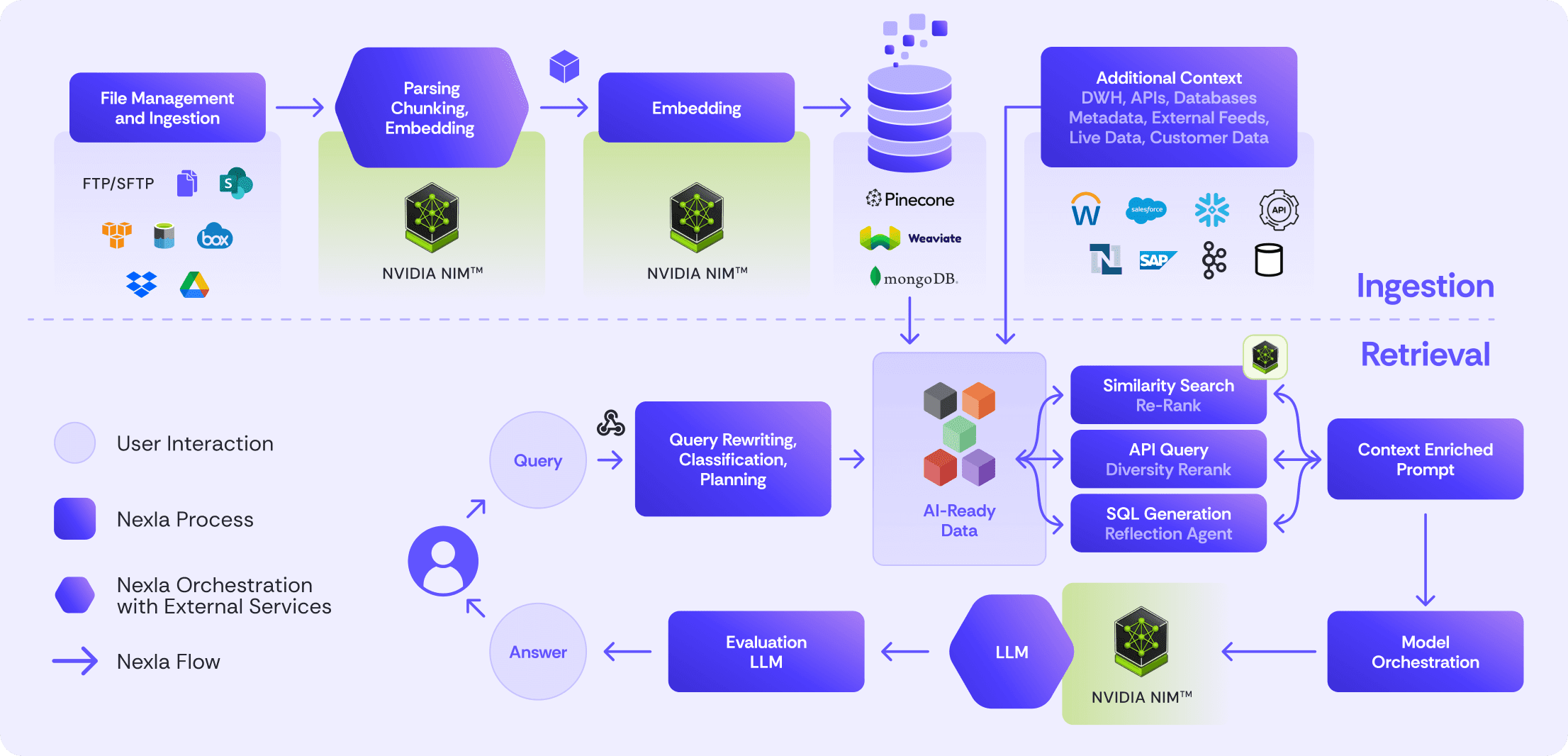
Let me talk about why I am optimistic about ICNProtocol.
As an old hand in Web3, I have seen many narrative shifts—#DeFi, #GameFi, #SocialFi, and now AI + DePIN.
However, most projects fail on two points: first, they cannot get the business running—either no one uses it or people cannot afford it. Second, they are too reliant on token prices and sentiment—when prices drop, no one works.
I appreciate ICNProtocol for the following reasons:
• The product is genuinely useful and can be sold
• Customers truly value it and are willing to use it long-term
• Infrastructure is deployed, and traffic can be supported
• Revenue, community, and application closed-loop before issuing tokens
• No airdrop beforehand, nor is it incentivized through 'node mining'
Its entire approach is much healthier than many #Web3 models that 'issue tokens first and build products later'. In other words, ICNProtocol's token is not a 'hype-driven' coin, but a network credential that can circulate and generate returns in real business. This 'money first, then issue tokens' model is extremely rare in Web3.

Summary: If #BTC is the decentralized revolution of currency, ICNProtocol could be the decentralized revolution of cloud services and computing power markets: breaking the monopoly of super large cloud vendors with global hardware contributors, achieving real performance-based rewards through on-chain incentives and performance verification mechanisms, and supporting the new generation of #AI and #Web3 applications with a highly programmable and composable service stack, thereby gradually migrating traditional enterprise clients from Web2 (compatibility).
ICNProtocol aims to be a 'truly decentralized AWS + GCP', transforming computing power and cloud infrastructure into a 'open source + shared + verified' global network, becoming the cornerstone of #AI and #Web3. If you are looking for a genuinely resilient #DePIN value project, @ICN_Protocol is absolutely worth your serious study and attention. 🧐